
EcoMat
Scope & Guideline
Leading the charge in eco-conscious chemistry innovations.
Introduction
Aims and Scopes
- Sustainable Energy Solutions:
The journal focuses on the development of materials and technologies that promote renewable energy sources, such as solar energy, hydrogen production, and battery technologies. - Electrocatalysis and Energy Storage:
Research on electrocatalytic materials, particularly for energy storage systems like batteries and supercapacitors, is a core area, emphasizing efficiency and sustainability. - Advanced Material Design:
EcoMat publishes studies on innovative materials, including nanomaterials and composites, that enhance performance in energy applications and environmental sustainability. - Environmental Remediation:
Research aimed at developing materials and systems for water purification, pollutant degradation, and waste recycling is a significant focus, reflecting the journal's commitment to environmental health. - Interdisciplinary Approaches:
The journal encourages interdisciplinary research that combines chemistry, materials science, and engineering to solve complex environmental challenges.
Trending and Emerging
- Two-Dimensional Materials:
Research on two-dimensional materials, particularly for energy storage and conversion applications, is gaining momentum, showcasing their unique properties and potential for high-performance devices. - Biomaterials and Natural Polymers:
There is a growing emphasis on using biopolymers and natural materials for sustainable applications, ranging from energy storage to environmental remediation, reflecting a trend towards eco-friendly solutions. - Hybrid and Composite Materials:
Emerging studies focus on hybrid systems that combine different materials to enhance performance in energy applications, indicating a trend towards innovative material combinations. - Smart and Wearable Technologies:
Research on wearable energy harvesting devices and sensors is expanding, highlighting the intersection of materials science with health and environmental monitoring. - Machine Learning in Materials Science:
The incorporation of machine learning techniques to predict material properties and optimize designs is on the rise, showcasing a trend towards data-driven research methodologies.
Declining or Waning
- Traditional Battery Technologies:
While the journal continues to publish research on batteries, there is a noticeable decline in studies focused on conventional lithium-ion technologies, as newer systems gain traction. - Basic Material Characterization:
Research emphasizing fundamental material characterization techniques without direct applications or innovations has decreased, suggesting a shift towards more applied research. - Conventional Photovoltaic Materials:
Research on traditional silicon-based solar cells is less frequently published, indicating a preference for novel materials and hybrid systems in photovoltaic research. - Single-Component Catalysts:
There is a waning interest in studies centered on single-component catalysts, as the field moves towards more complex, multi-functional materials that can enhance catalytic performance.
Similar Journals
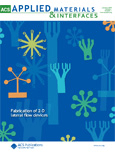
ACS Applied Materials & Interfaces
Elevating Knowledge in Materials Science and NanotechnologyACS Applied Materials & Interfaces, published by the American Chemical Society, stands as a leading journal in the field of applied materials, nanotechnology, and interdisciplinary research in medicine. With an impressive Impact Factor that places it in the Q1 category across Materials Science, Medicine, and Nanoscience and Nanotechnology, this journal consistently ranks among the top tier, evidencing its significance and influence in advancing scientific knowledge. The journal’s scopus ranking of 33 out of 463 in General Materials Science further underscores its critical role in disseminating innovative and high-quality research. Although it is not an open-access journal, a diverse range of access options is available, ensuring that vital research findings are accessible to a broad audience of researchers, professionals, and students. Targeting breakthroughs in the synthesis, characterization, and application of materials and interfaces, ACS Applied Materials & Interfaces serves as a pivotal platform for publishing cutting-edge studies essential for future technological advancements.
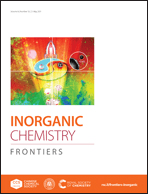
Inorganic Chemistry Frontiers
Connecting Ideas, Inspiring Discoveries in Inorganic ChemistryInorganic Chemistry Frontiers, published by the esteemed Royal Society of Chemistry, stands at the forefront of advancements in the field of inorganic chemistry, boasting a prestigious Q1 ranking in its category as of 2023 and an impressive Scopus Rank of #3 out of 79, placing it in the 96th percentile. Since its inception in 2014, this journal has provided a robust platform for high-quality research that spans the diverse and rapidly evolving areas of inorganic chemistry. As an open-access journal, it ensures that the findings presented are readily accessible to researchers, educators, and practitioners globally, fostering an inclusive environment for the dissemination of knowledge. With its rigorous peer-review process, Inorganic Chemistry Frontiers aims to facilitate interdisciplinary dialogue and innovation, making it an essential resource for anyone dedicated to exploring the myriad applications and theoretical advancements within inorganic chemistry.

Energy Materials
Exploring Breakthroughs in Energy Materials Science.Energy Materials is a pioneering journal published by OAE PUBLISHING INC, dedicated to the dynamic field of energy materials science and engineering. With a focus on advancing knowledge related to materials used in various energy applications such as batteries, fuel cells, and solar cells, this open-access journal aims to disseminate cutting-edge research and innovative methodologies to a global audience. By offering a platform for original research, reviews, and case studies, Energy Materials plays a crucial role in bridging the gap between materials science and energy technology, facilitating the development of sustainable energy solutions. Researchers, professionals, and students alike will find invaluable insights in its pages, fostering advancements in this essential sector. To explore the latest developments in energy materials, visit Energy Materials at OAE PUBLISHING INC.
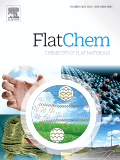
FlatChem
Pioneering Breakthroughs in Ceramics and CompositesFlatChem, an esteemed journal published by ELSEVIER, serves as a premier platform for disseminating high-quality research in the dynamic fields of ceramic and composite materials, electronic and optical materials, materials chemistry, and surfaces, coatings, and films. Since its inception in 2017, the journal has garnered a robust reputation, evidenced by its rank in the top quartile (Q1) across multiple categories, including a commendable rank of #25/127 in Ceramics and Composites and #49/284 in Electronic, Optical and Magnetic Materials. With a focus on pioneering advancements and innovative methodologies, FlatChem not only highlights cutting-edge research but also promotes collaboration and knowledge exchange within the scientific community. The journal’s impact is underscored by its impressive rankings in Scopus, marking it as a vital resource for researchers, professionals, and students aiming to stay at the forefront of materials science. As an open-access journal, it ensures that groundbreaking findings are readily accessible, fostering a broader understanding and application of materials innovation worldwide. The journal is based in the Netherlands, with its headquarters located at RADARWEG 29, 1043 NX AMSTERDAM, NETHERLANDS. Join the vibrant community contributing to FlatChem and engage with the forefront of material advancements.

Accounts of Materials Research
Empowering researchers with cutting-edge insights.Accounts of Materials Research is a premier journal published by the American Chemical Society, focusing on the multidimensional field of materials science. With a robust impact factor and a commitment to open-access research, it serves as a vital platform for leading-edge discoveries from 2020 to 2024. The journal has rapidly ascended to the top quartile in multiple categories, including Chemical Engineering, Materials Chemistry, and Polymers and Plastics, demonstrating its significant influence within the academic community. Recognized by Scopus as a key resource—with remarkable rankings that place it in the 95th percentile of its field—Accounts of Materials Research is devoted to publishing high-quality, innovative research that addresses critical challenges in materials development and implementation. This journal is essential for researchers, professionals, and students seeking to stay informed about the latest advancements and collaborative opportunities within the interdisciplinary landscape of materials science.

MRS Energy & Sustainability
Innovating Materials for a Greener TomorrowMRS Energy & Sustainability is a premier interdisciplinary journal published by SpringerNature, focusing on advancing the understanding of energy systems and sustainability within the context of materials science and engineering. Since its inception in 2014, this journal has rapidly gained recognition in the academic landscape, achieving impressive rankings including Q1 in Electronic, Optical and Magnetic Materials and Mechanics of Materials, and Q2 in Energy Engineering and Power Technology as well as Renewable Energy, Sustainability and the Environment, as of 2023. The journal's ISSN is 2329-2229 and E-ISSN is 2329-2237. With a commitment to open access, it provides researchers and professionals with the latest findings and insights essential for guiding innovations in energy solutions and sustainable practices. The journal's global reach and high-impact reputation make it an invaluable resource for scientists, engineers, and policymakers dedicated to addressing the contemporary challenges of energy and sustainability. With a diverse scope and high Scopus rankings, MRS Energy & Sustainability continues to be at the forefront of research that shapes our energy future.
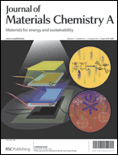
Journal of Materials Chemistry A
Leading the Charge in Sustainable Materials ResearchJournal of Materials Chemistry A, published by the Royal Society of Chemistry, stands as a leading peer-reviewed journal in the fields of Chemistry, Materials Science, and Renewable Energy. With an impressive ranking within the top quartile (Q1) across these disciplines in 2023, this journal not only showcases groundbreaking research but also addresses pivotal challenges in sustainable materials and energy. Spanning from 2013 to 2024, it serves as a vital platform for scientists and engineers to present innovative solutions and advances in materials that directly contribute to environmental sustainability. Accessible to a broad audience, the journal's contributions are essential for anyone engaged in the development of new materials and technologies that promise to shape a greener future. With a commitment to high-quality open access publishing, the Journal of Materials Chemistry A is instrumental in disseminating impactful research to enhance scholarly communication and foster collaboration in an increasingly interconnected research landscape.

Interdisciplinary Materials
Bridging Knowledge Gaps in Materials ResearchInterdisciplinary Materials is a prominent Open Access journal published by Wiley, dedicated to advancing knowledge and innovation in the field of materials science. With an ISSN of 2767-4401 and an E-ISSN of 2767-441X, this journal seeks to foster interdisciplinary collaborations and promote high-quality research that bridges the gap between materials engineering, physics, chemistry, and emerging technologies. Established in 2022, it aims to provide free and unrestricted access to cutting-edge research findings, ensuring that pivotal discoveries reach a broad audience. Interdisciplinary Materials assesses submissions rigorously, aspiring to achieve high impact and relevance, catering to researchers, professionals, and students keen on exploring innovative materials and their applications. With its commitment to scientific excellence, this journal stands as a vital resource for those looking to stay abreast of the latest advancements in materials research.
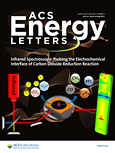
ACS Energy Letters
Illuminating the Path to Sustainable Energy SolutionsACS Energy Letters, published by the American Chemical Society, is a prestigious peer-reviewed journal designed to disseminate innovative and impactful research in the multifaceted field of energy science. Since its inception in 2016, the journal has quickly ascended to a remarkable status, achieving Q1 rankings in critical categories including Chemistry (miscellaneous), Energy Engineering and Power Technology, Fuel Technology, Materials Chemistry, and Renewable Energy, Sustainability and the Environment as of 2023. With an emphasis on rigorous research methodologies and interdisciplinary collaboration, ACS Energy Letters serves as a vital platform for scholars, professionals, and students to explore cutting-edge research that addresses contemporary energy challenges. While maintaining a commitment to advancing knowledge without open access, it offers profound insights into sustainable practices and innovative solutions that are crucial for the future of energy systems globally. The journal's esteemed standing in the chemical and energy sectors underscores its significance, making it an essential resource for anyone invested in the advancement of energy technologies and sustainable practices.
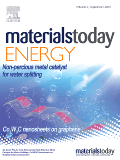
Materials Today Energy
Advancing Sustainable Solutions for Tomorrow's Energy NeedsMaterials Today Energy is a premier journal published by Elsevier, focusing on the interdisciplinary field of energy materials. With an ISSN of 2468-6069, the journal is renowned for its impactful research as evidenced by its impressive Q1 quartile rankings in multiple categories including Energy Engineering and Power Technology, Fuel Technology, and Renewable Energy. It stands out with strong Scopus rankings, highlighting its significance in the respective research communities, such as being ranked 3rd in Nuclear Energy and Engineering. Established from 2016 to 2024, the journal aims to provide a platform for innovative research that addresses the global demands for sustainable energy solutions. Although it is not open access, Materials Today Energy is accessible to a broad audience, encouraging collaborations among researchers, professionals, and students in the pursuit of advancing materials science and energy technologies. This makes it an essential resource for those looking to remain at the forefront of discoveries that shape the future of energy.